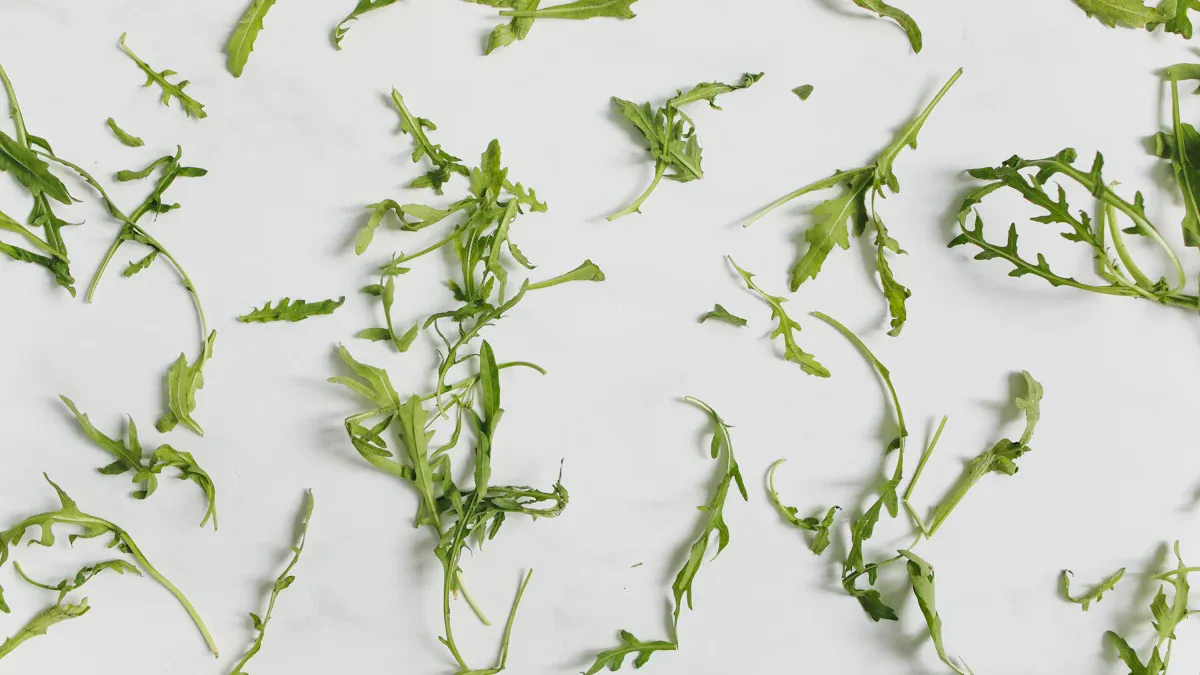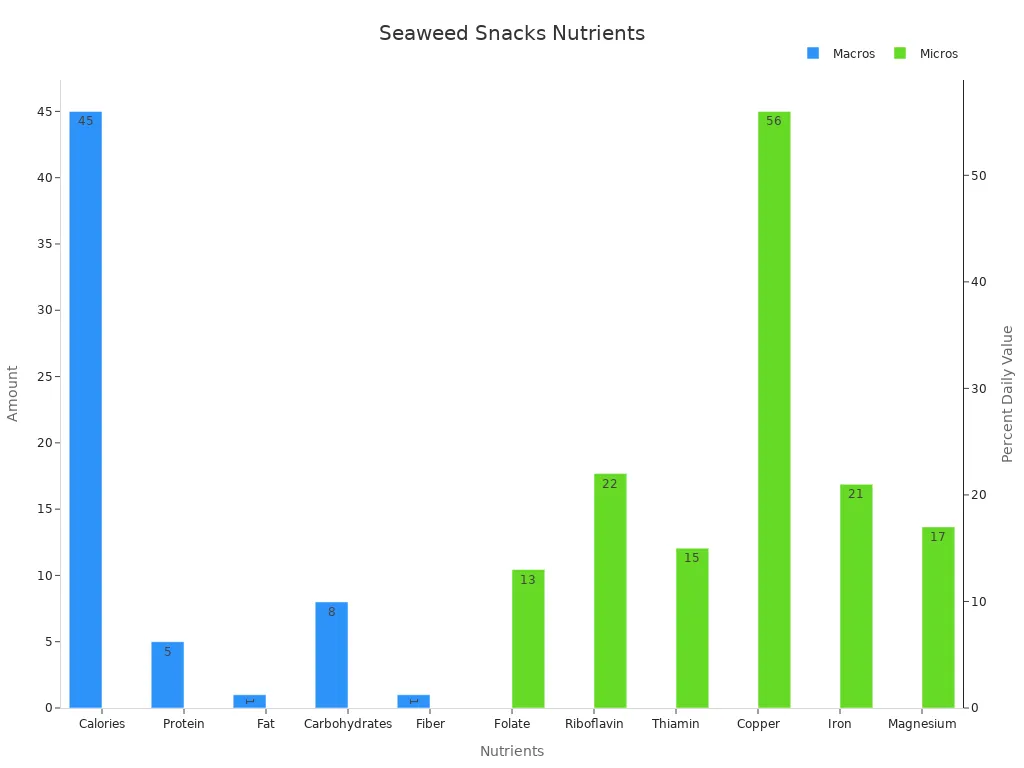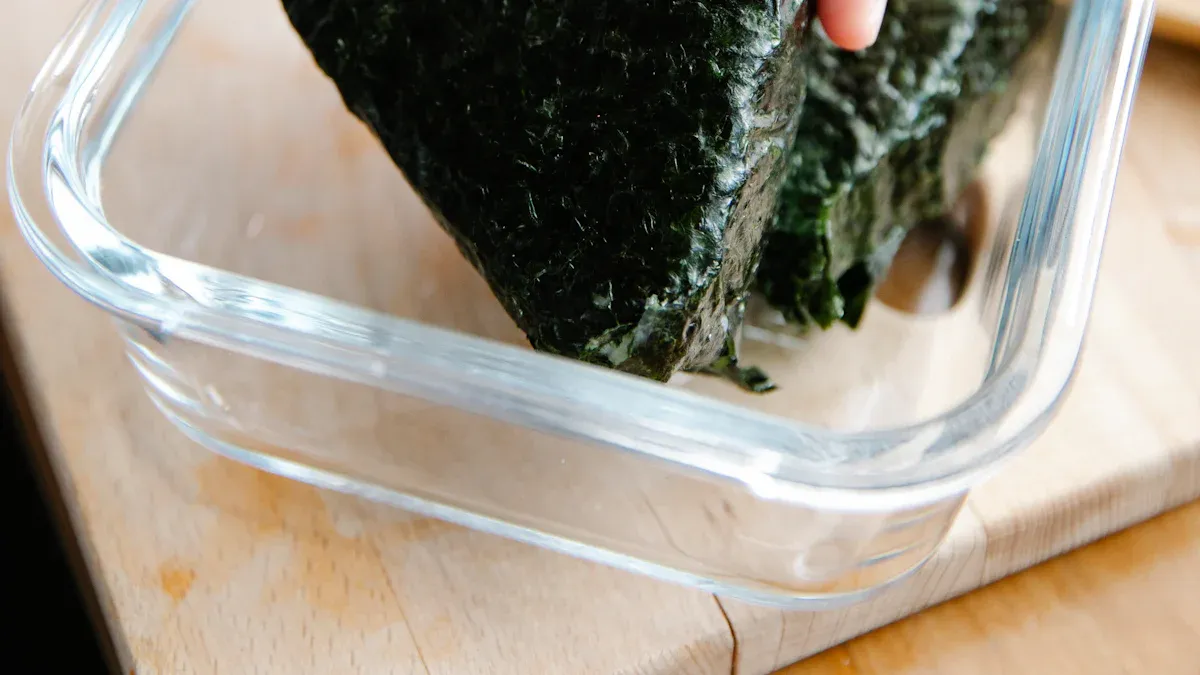
Seaweed snacks are packed with nutrients that your body needs. These savory treats deliver essential vitamins, minerals, and antioxidants. Their popularity has surged worldwide:
- The market was valued at $1.42 billion in 2021.
- It is projected to reach $3.16 billion by 2029, growing at a 10.50% annual rate.
Adding them to your diet can support your health in many ways.
Key Takeaways
- Seaweed snacks have iodine, which helps the thyroid work well. Eat them in small amounts to avoid too much iodine.
- They are full of important vitamins and minerals like iron and calcium. These help make bones strong and give you more energy.
- Eating seaweed snacks can help your stomach stay healthy. They have fiber that feeds good bacteria in your gut.
Nutritional Value of Seaweed Snacks

Iodine and Thyroid Support
Seaweed snacks are an excellent source of iodine, a mineral your body needs for thyroid health. Iodine helps your thyroid produce hormones that regulate metabolism, energy levels, and growth. The iodine content in seaweed varies depending on the type, harvest season, and location. For example, some seaweed varieties like kelp contain high iodine levels, which can exceed the recommended daily intake of 150 micrograms. While iodine supports thyroid function, consuming too much may lead to temporary hyperthyroidism or other thyroid-related issues. Moderation is key to reaping the benefits without risks.
Vitamins and Minerals
Seaweed snacks are packed with essential vitamins and minerals that support your overall health. They contain iron, calcium, magnesium, and potassium, which are vital for strong bones, muscle function, and oxygen transport in your blood. Additionally, seaweed provides vitamins A, C, and B-complex, which boost your immune system and energy levels. Here’s a quick look at the nutritional breakdown of a typical 15g serving of seaweed snacks:
| Nutrient | Amount per 15g serving |
|---|---|
| Calories | 45 |
| Protein | 5 g |
| Fat | 1 g |
| Carbohydrates | 8 g |
| Fiber | 1 g |
| Iron | 21% DV |
| Calcium | 55.80 mg |
| Magnesium | 17% DV |
| Copper | 56% DV |
These nutrients make seaweed snacks a nutrient-dense addition to your diet.
Antioxidants and Cellular Health
Seaweed snacks are rich in antioxidants, including vitamins A, C, and E, as well as plant compounds like flavonoids and carotenoids. These antioxidants protect your cells from damage caused by free radicals. By reducing free radical activity, antioxidants lower the risk of chronic diseases such as heart disease, diabetes, and certain cancers. Including seaweed snacks in your diet can help maintain cellular health and support your body’s natural defense system.

Health Benefits of Seaweed Snacks
Thyroid Health
Seaweed snacks are rich in iodine, a mineral essential for thyroid function. Your thyroid uses iodine to produce hormones that regulate metabolism and energy levels. Insufficient iodine can lead to hypothyroidism, causing fatigue and weight gain. However, moderation is crucial, as excessive iodine intake may also disrupt thyroid health. Pregnant women benefit from iodine-rich foods like seaweed, as iodine supports fetal brain development. Including seaweed snacks in your diet can help maintain a healthy thyroid.
Gut Health
Seaweed snacks contain prebiotic fiber, which nourishes beneficial bacteria in your gut. This fiber travels through your digestive system, promoting a balanced microbiota. A healthy gut microbiota improves digestion and may reduce the risk of colon cancer. By adding seaweed snacks to your diet, you support digestive efficiency and overall gut health.
Heart Health
Seaweed snacks contribute to heart health in several ways. Their high fiber content helps lower cholesterol by delaying absorption in the intestines. Studies show that regular seaweed consumption increases HDL cholesterol and reduces fat deposition in the liver. These effects lower the risk of heart attacks and strokes.
Blood Sugar Control
Seaweed snacks are a healthier alternative to conventional snacks. Their fiber content slows digestion, preventing blood sugar spikes. Research indicates that brown seaweed improves blood glucose levels and helps manage diabetes metrics like hemoglobin A1c. Adding seaweed snacks to your diet can support better blood sugar control.
Weight Management
Seaweed snacks are low in calories and high in fiber, making them ideal for weight management. Fiber enhances satiety, delaying hunger signals and reducing calorie intake. A study found that seaweed consumption decreased appetite compared to other protein sources. Choosing seaweed snacks over traditional options can help you achieve your weight loss goals.
Potential Risks of Seaweed Snacks
Excess Iodine
Seaweed snacks are a rich source of iodine, but consuming too much can harm your thyroid. Your body needs iodine to produce thyroid hormones, but excessive intake may lead to hyperthyroidism, thyroiditis, or even goiter. The tolerable upper intake level for iodine is 1,100 mcg per day for adults. Some seaweed snacks contain iodine levels far beyond this limit, ranging from 66.5 mcg to over 18,000 mcg per serving. Long-term exposure to such high amounts can also cause kidney damage. To avoid these risks, check the iodine content on the packaging and limit your intake to recommended levels.
Heavy Metals
Seaweed snacks may contain heavy metals like lead, cadmium, and arsenic. These metals can accumulate in seaweed due to environmental factors. Research shows that some products, such as Gimme Organic Roasted Seaweed Snacks, have arsenic levels 35 times higher than high-arsenic rice. This poses significant health risks, especially for children. Heavy metal exposure has been linked to reproductive harm, cancer, and developmental issues. Many seaweed products include warning labels about these dangers. To minimize exposure, choose brands that test for heavy metals and consume seaweed snacks in moderation.
Medication Interactions
Seaweed snacks can interact with certain medications, potentially causing adverse effects. For example, their high vitamin K content may reduce the effectiveness of blood thinners like warfarin. A case study reported that a patient experienced changes in INR levels after consuming large amounts of seaweed. Additionally, excessive iodine intake from seaweed has been linked to thyroid issues, such as hypothyroidism in children and newborns. If you take medications or have thyroid concerns, consult your doctor before adding seaweed snacks to your diet.
How to Incorporate Seaweed Snacks

Snack Ideas
Seaweed snacks are versatile and easy to enjoy on their own or paired with other foods. Their crispy texture and savory flavor make them a satisfying alternative to traditional chips. You can try:
- Dried seaweed sheets as a quick, on-the-go snack.
- Flavored seaweed crisps, which come in options like sesame or wasabi.
- Seaweed-wrapped rice balls for a filling and nutritious treat.
Brands like SeaSnax offer healthy options made with organic seaweed and olive oil, free from artificial additives. These snacks are popular among health-conscious consumers and fit well into diets like Paleo or Keto. With the seaweed snack market expected to exceed $9 billion by 2024, you’re not alone in choosing this nutrient-packed option.
Tip: Keep a pack of seaweed snacks in your bag for a guilt-free snack anytime!
Recipe Additions
Seaweed snacks can elevate your meals with added flavor and nutrition. Their rich content of vitamins, minerals, and protein makes them a valuable ingredient in various dishes. You can:
- Sprinkle seaweed flakes or granules over soups, salads, or rice bowls for a savory boost.
- Blend seaweed powder into smoothies or dips to enhance their nutritional profile.
- Use whole seaweed sheets to wrap sushi or as a garnish for casseroles.
Seaweed’s high iodine and fiber content also promote heart health and digestion. Culinary publications often highlight its versatility, with recipes incorporating seaweed into everything from broths to baked goods.
Healthy Substitutes
Seaweed snacks stand out as a nutritious alternative to other snacks. Compared to chips or crackers, they are lower in calories and higher in essential nutrients. Here’s how different types of seaweed compare in terms of benefits:
| Seaweed Type | Nutritional Benefits |
|---|---|
| Nori | Protein, antioxidants, vitamin B12 |
| Dulse | Supports healthy triglyceride levels |
| Irish Moss | Minerals, omega-3, prebiotic fiber |
| Spirulina | Protein, B12, iron, beta-carotene |
Seaweed snacks also cater to diverse dietary needs, offering options for vegetarians, vegans, and those seeking gluten-free alternatives. By choosing seaweed, you enjoy a snack that satisfies cravings while supporting your health.
Note: Experiment with different seaweed varieties to find your favorite flavor and texture!
Seaweed snacks provide a delicious way to boost your health. They support thyroid function, improve digestion, and help manage weight. Studies show that brown seaweed reduces cholesterol and improves blood sugar control. Fucoxanthin, found in seaweed, lowers blood pressure and triglycerides. While these snacks are nutritious, consuming them in moderation ensures you avoid excess iodine or heavy metals.
| Study Year | Findings | Link |
|---|---|---|
| 2023 | Brown seaweed consumption significantly improved postprandial blood glucose and HbA1c. | Link |
| 2023 | Fucoxanthin reduces body weight, blood pressure, and triglyceride levels. | Link |
| 2023 | Brown seaweed intake significantly decreased total cholesterol and LDL levels. | Link |
Tip: Add seaweed snacks to your meals or enjoy them as a standalone treat for a flavorful and healthful boost!
FAQ
What are the best types of seaweed snacks for beginners?
Start with nori sheets or seaweed crisps. They have a mild flavor and crispy texture, making them ideal for first-time seaweed snackers.
Can you eat seaweed snacks every day?
Yes, but in moderation. Check the iodine content on the packaging to avoid excessive intake, which may affect your thyroid health.
Are seaweed snacks safe for children?
Seaweed snacks are safe for children when consumed in small amounts. Choose brands that test for heavy metals to ensure safety.
Tip: Always read the nutrition label to make informed choices!
